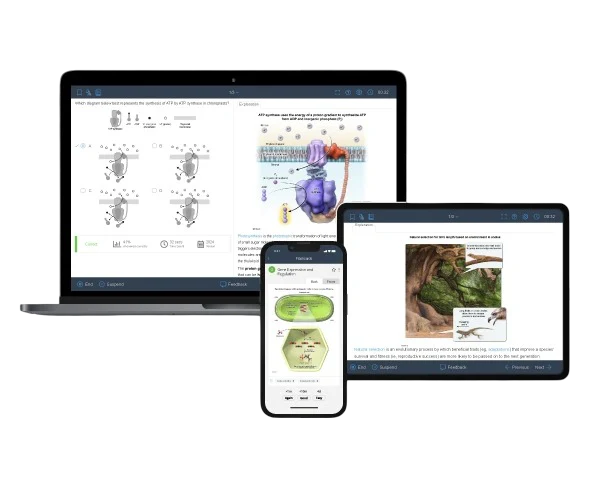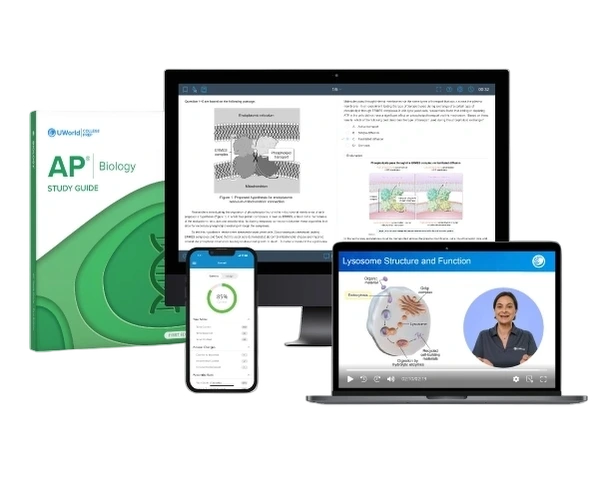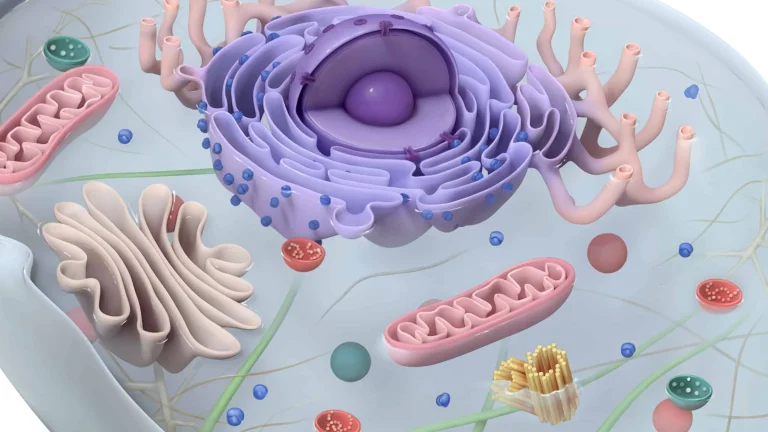Whether you are reviewing throughout the year or preparing closer to test day, the right study strategies make a difference. This guide covers how to study for AP Bio, create an effective AP Bio study plan, and prepare for unit tests and the final exam using methods aligned with the exam format so you can study more efficiently and confidently.
Why You Need a Study Plan for AP Biology
AP Biology covers a wide range of topics, and the exam tests both content knowledge and scientific reasoning. Without a clear plan, it is easy to spend too much time memorizing details while missing opportunities to practice applying concepts in exam-style questions similar to those on the AP Bio exam.
A structured AP Bio study plan helps you manage the course workload, pace your review, and stay consistent throughout the year. It also makes it easier to identify weak areas early so you can adjust how long you need to study for the AP Bio exam and focus your time more effectively as test day approaches.
Take a Diagnostic Test First
Before creating your AP Bio study plan, it is important to understand where you currently stand. Taking a diagnostic test helps you identify which topics you already understand and which areas need more focused review. This step is especially useful if you are figuring out how to study for AP Biology effectively or planning how long you need to study for the AP Bio exam.
A full-length or unit-based AP Biology practice test gives you a realistic sense of the exam format and questio n style. Reviewing your results allows you to prioritize weaker units, avoid spending too much time on familiar topics, and build a more targeted AP Bio study plan from the start.
How To Study for AP Biology - Study Plans
Success in AP Biology comes from effective study habits and a strategic approach. These AP Biology study plans and tips will help you stay on track, retain information, and perform your best on the AP Biology exam.
- Begin in February to ensure ample time to cover all units.
- Units 1-2 (Chemistry of Life & Cell Structure and Function): Spend 1 week.
- Units 3-4 (Cellular Energetics & Cell Communication/Cell Cycle): Spend 2 weeks.
- Units 5-6 (Heredity & Gene Expression and Regulation): Spend 2 weeks.
- Unit 7 (Natural Selection): Spend 1.5 weeks.
- Unit 8 (Ecology): Spend 1 week.
- Refresh your understanding using your textbook or UWorld’s AP Biology Study Guide.
- Set aside 2 to 3 short sessions each week to review MCQ-style practice questions.
- Consistently revisit challenging concepts.
- Start timing your MCQs to match exam conditions: Aim for about 1.5 minutes per question.
- Review past FRQs from the College Board to familiarize yourself with potential essay questions.
- Outline and practice writing responses at least twice a month.
- Time yourself to adapt to the exam pace.
- Create and review flashcards daily for key formulas and rules.
- Regularly schedule breaks to stay refreshed; plan a day off each week or take an afternoon off when necessary.
- Start with a general review of course topics, unit by unit at a quicker pace.
- Utilize resources such as textbooks, AP Biology Prep Books, class notes, and course materials for concept refreshers.
- Prioritize completing textbook practice problems and using the UWorld's AP Biology Practice Test QBank 2 to 3 times per week for 20-30 minutes per study session.
- With UWorld: To save time, focus on explanations for missed questions and reviewing the concepts that need the most improvement.
- Units 1–3 (Chemistry of Life, Cell Structure, & Cellular Energetics): Allocate 1 week. Spend ~2–3 days per unit.
- Units 4–6 (Cell Communication, Heredity, Gene Expression): Allocate 1 week. Aim for ~2 days per unit.
- Units 7–8 (Natural Selection & Ecology): Allocate 1 week. Spend ~3–4 days total.
- Use any remaining time to review concepts from each unit that you missed previously to reinforce learning.
Kick off your study by tackling a few UWorld AP Biology MCQs in each topic to spot the ones that are harder to you. Dive into the explanations for any questions you miss. If you're still feeling shaky, watch a video or review your notes on those tough topics. Then, circle back with more UWorld questions to see how much you've improved!
Spend most of your week diving into AP Biology FRQs; they're a great way to cover lots of topics at once and are really efficient for review. Plus, they make you show your work, which helps you get a solid handle on the whole problem-solving process.
Focus only on high-level concepts from each AP Biology unit. Avoid learning new material. Review summaries, key diagrams, and definitions to reinforce understanding without overwhelming yourself.
Work through a small set of mixed AP Biology questions to stay sharp. Prioritize reviewing explanations for any questions you miss and clarify lingering doubts rather than completing large question sets.
Skim through a few past AP Biology FRQs to remind yourself how questions are structured. Focus on understanding what each question is asking and how responses are typically organized, rather than writing full answers.
Review exam timing, question types, and pacing strategies. Make sure you know how much time to spend on multiple-choice questions and free-response sections so you can stay calm and focused on test day.
Get a good night’s sleep and prepare everything you need for the exam in advance. Avoid last-minute cramming, as being rested and focused will help you perform better than extra studying.
How to Get a 3, 4, or 5 on the AP Biology Exam
Achieving a top score on the AP Biology exam takes dedication, smart study strategies, and regular practice. Follow these expert-backed AP Biology study tips to strengthen your understanding and improve your performance.
- Take Advantage of Valuable Class Time
- Take Organized Notes
- Enhance Scientific Thinking Through Lab Work
- Leverage Video Lessons for Better Retention
- Practice with AP-Level Questions
Make the most of your time in AP Biology class. Regardless of your learning style, the key to effective learning is mental engagement. Think critically about the course content, ask questions if you’re unclear, and engage in productive discussions with your teacher and classmates.
Avoid messy notes; keep them structured for easy review. Use our digital notebook to organize key concepts, diagrams, and images for quick reference. Struggling with a topic? Create flashcards, which use spaced-repetition technology to reinforce difficult concepts until you’ve mastered them.
It is important to have a solid understanding of the AP Biology labs to score high on the exam. The more hands-on experience you gain, the better you’ll develop critical scientific thinking skills and grasp key concepts and science practices that form the foundation of the course.
Supplement your learning with informational video lectures to break down complex topics. Jot down key points as you watch, and write down any questions to discuss in class the next day for further clarification.
Consistent practice with high-quality questions is crucial. Use trusted resources like UWorld to work through AP-style questions with detailed explanations for correct and incorrect answers. To stay on track, form a study group with motivated classmates, grade each other’s FRQs and discuss challenging topics to deepen your understanding.

Use Study Methods That Work for AP Biology
Studying for AP Biology is most effective when you use evidence-based methods that reinforce understanding and improve application. Combining the right study techniques with reliable AP Biology prep resources helps you retain information, identify weak areas, and prepare confidently for exams.
Active Recall for AP Biology
Active recall is a powerful technique for improving long-term retention in AP Biology. Instead of passively rereading notes, actively test yourself by answering questions from memory, explaining biological processes out loud, or summarizing key concepts without looking at your materials.
This method is especially effective for reinforcing understanding of complex topics such as cellular respiration, gene regulation, and feedback mechanisms. Regularly challenging yourself to recall information helps identify gaps early and strengthens your ability to apply concepts during exams and tests.
Spaced Repetition for AP Bio
Spaced repetition involves reviewing information at increasing intervals to strengthen memory and prevent forgetting. This method is especially useful for AP Biology, where students must retain terminology, pathways, and experimental concepts over an extended period.
Short, consistent review sessions using flashcards or targeted practice help reinforce difficult material. Many comprehensive AP Biology prep resources include digital tools that support spaced repetition, making it easier to revisit challenging concepts until they are fully mastered.
Practice Questions and Error Review
Regular practice with AP-style questions is essential for understanding how concepts are tested on the AP Biology exam. Working through multiple-choice and free-response questions helps you strengthen data analysis skills, interpret experimental scenarios, and apply biological principles accurately.
Using official past exam questions helps you become familiar with question structure and scoring expectations. In addition, a structured AP Biology review course can streamline preparation by combining high-quality practice questions with detailed explanations and progress-tracking tools.
The most important step is reviewing mistakes carefully. Take time to understand why an answer was incorrect, revisit the related concept, and practice similar questions to reinforce learning and improve accuracy over time.

Frequently Asked Questions (FAQs)
Which AP Biology units are the most difficult to learn?
For the 2025 AP Biology exam, the free-response questions drew significantly from molecular and cellular systems, particularly Unit 2: Cell Structure and Function, Unit 4: Cell Communication and Cell Cycle, and Unit 6: Gene Expression and Regulation, which include topics such as cell signaling, protein trafficking, transcription, and translation. The exam also tested broader concepts from Unit 7: Natural Selection and Unit 8: Ecology, requiring students to apply evolutionary and ecological principles to real-world scenarios.
Many students find these cross-unit applications challenging, especially when questions require data interpretation, experimental analysis, and synthesis across multiple biological processes. Preparing with practice questions that require connecting concepts from different units, rather than studying topics in isolation, can make these complex areas more manageable and improve overall exam performance.
How do I self-study for AP Biology?
Self-studying for the AP Biology exam allows you to tailor your learning experience and focus on areas where you need the most improvement. Success depends on following a clear plan, practicing consistently, and reviewing mistakes carefully.
Using comprehensive prep resources such as UWorld can help streamline self-study by offering an extensive question bank, detailed answer explanations, practice tests, and customizable flashcards to reinforce key concepts efficiently. Regular practice with AP-style questions and focused review of weak areas are especially important when preparing independently.
How many practice questions should I do for AP Biology?
There is no fixed number of practice questions that guarantees success, but consistency matters more than volume. Most students benefit from completing small, regular sets of practice questions throughout their preparation rather than saving everything for the end.
Focus on answering enough questions to expose weaknesses across different units, then spend time reviewing mistakes and understanding why an answer was incorrect. As the exam approaches, practicing mixed sets of multiple-choice and free-response questions can help improve endurance, pacing, and accuracy.
How do top scorers study for AP Biology differently?
Top scorers typically focus on how they study, not just how much they study. Instead of memorizing facts, they prioritize understanding biological processes, analyzing data, and explaining relationships between concepts across units.
They also practice actively by testing themselves often, reviewing errors carefully, and adjusting their study plans based on performance. Many high-scoring students regularly work with exam-style questions, practice free-response answers under timed conditions, and revisit difficult topics multiple times using spaced review rather than one-time cramming.
References
- College Board. (2026). AP Biology: About the course. Retrieved from https://apcentral.collegeboard.org/courses/ap-biology
- College Board. (2026). AP Biology: About the exam. Retrieved from https://apcentral.collegeboard.org/courses/ap-biology/exam
- College Board. (2026). AP Biology course and exam description (Fall 2025). Retrieved from https://apcentral.collegeboard.org/media/pdf/ap-biology-course-and-exam-description.pdf
- College Board. (2025). AP Biology 2025 free-response questions. Retrieved from https://apcentral.collegeboard.org/media/pdf/ap25-frq-biology.pdf




